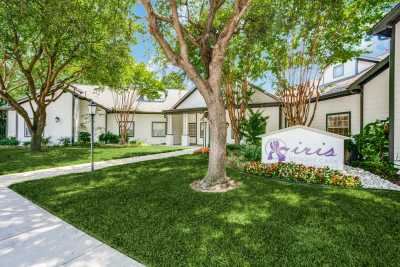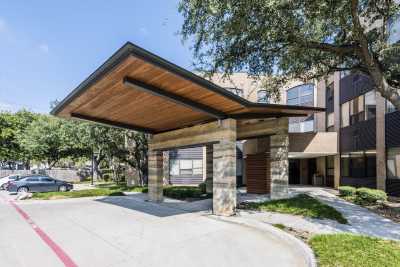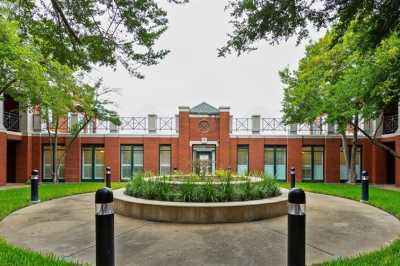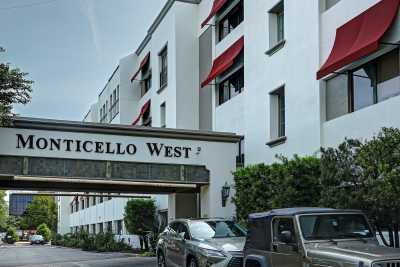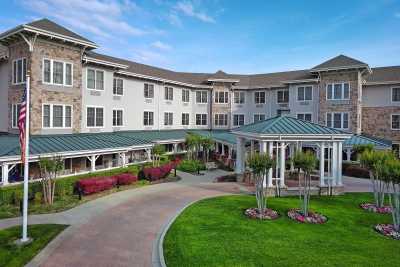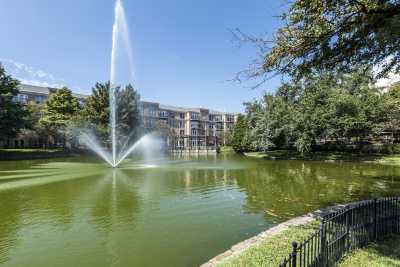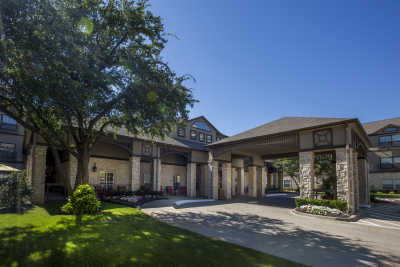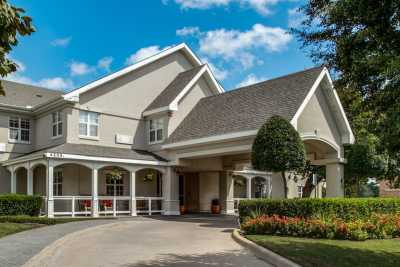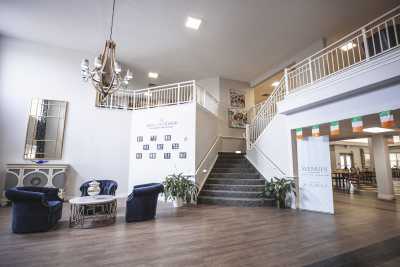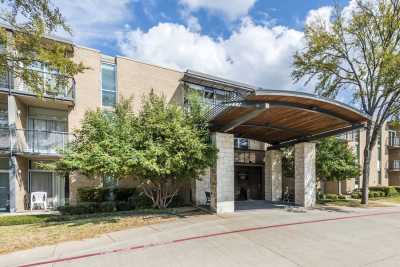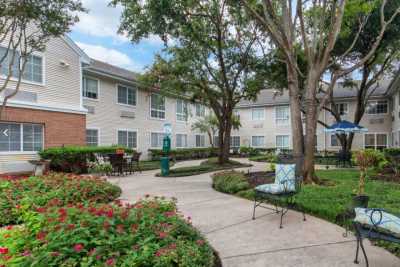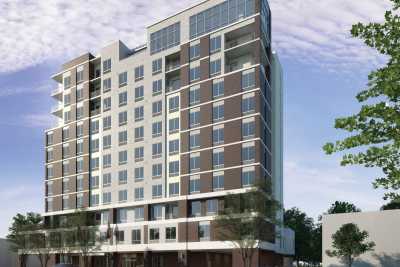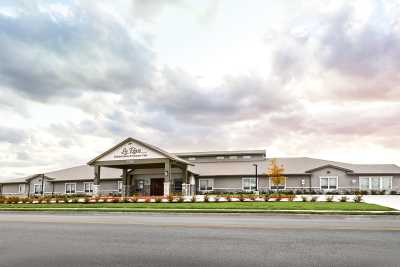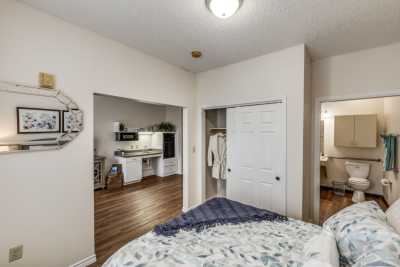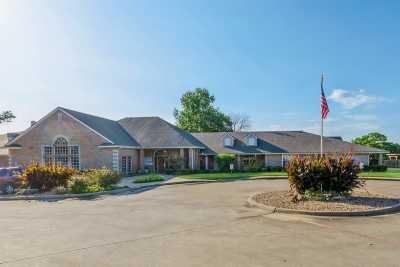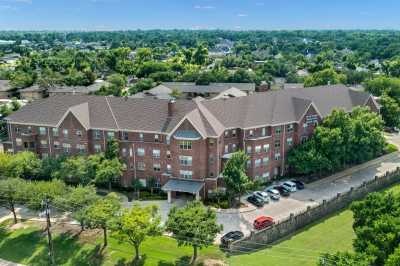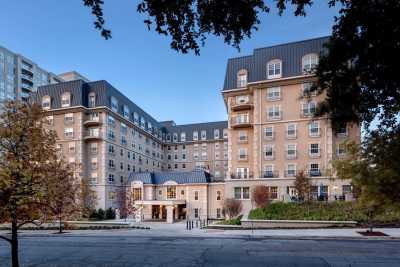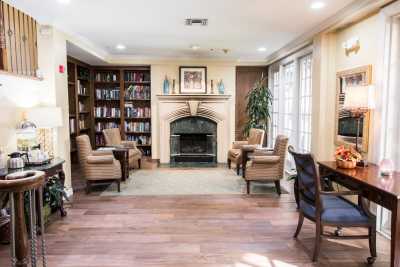
10 Best Memory Care Facilities in Dallas, TX
Dallas, Texas, has a variety of memory care options for people living with dementia or Alzheimer’s disease. A Place for Mom partners with 28 memory care facilities within a 10-mile radius of Downtown Dallas. These communities are designed to provide a personalized experience filled with meaningful activities and thoughtful care services, all specialized for people with dementia.
When it comes to memory care in Dallas, personalization is almost unlimited. You and your loved one can prioritize preferences, whether it’s size of facility, available amenities and activities, or service plans. Seniors can also choose from stand-alone memory care facilities to larger assisted living facilities with attached memory care units, so couples with different needs can continue living in the same community.
The state of Texas also has robust regulations to govern the quality of care and programs at these memory care facilities. And, Dallas’ year-round warm weather and enticing attractions are an added bonus. In this guide, you’ll find information on local memory care costs, payment tips, facility regulations, senior-specific local activities, and more to help you narrow down your search for the right memory care community.
Dallas Memory Care Facilities | 1153 Reviews
Very nice facility. The staff is very friendly, they care a lot about the residents and they take care of them really well. They're very knowledgeable when it comes to the needs of residents and if families...
I'm so grateful that we found Brookdale Assisted Living. The people here are so caring and sweet. We felt welcome from the very start of my moms time here. Mom walks a lot more than before she moved in the...
We have dealt with [name removed] from the beginning and she is so amazing. She’s very interested in helping and she did ans actuallY still does. She is always texting pictures of our cousin and letting us...
As far as the snacks go, they don't really offer them. My father is kind of inward with dementia and I have to keep bringing things like maybe a diet soda or wants a donut or the cranberry juice is actually...
Long time caring staff. Very responsive. Only negative is the transportation services. Limited availability and some activities cancelled at last minute. I absolutely recommend Forum at Park Lane to...
My friend's experience has been very positive. I just can't say enough good things about the staff ! They have all been incredibly helpful and kind. One of the reasons I picked Monticello West was because of...
Sunrise on Hillcrest is a top quality Assisted Living with the most caring and compassionate staff. Very soon after moving my Grandmother to Sunrise on Hillcrest, they all became an extension to our family.
My mom needed Assisted Living so I looked for these things: her safety, good care, and an environment where she can be happy. Due to a fall mom needed Rehab care first and Signature Pointe is the only place...
Mom moved in a few months ago and has enjoyed herself very much. There are plenty of activities and she has made many friends. The staff is friendly and the dining room staff is top notch. Having...
It's a great community that continuously evolves based on the members of the community. The staff is so warm and caring...they really know what they are doing. I don't think there is a better facility out...
Our free advisors can help
- Compare local facilities
- Determine care type
- Schedule tours
- Evaluate pricing
Overall, a very professional organization with good service and care. Downside; food, as usual, very bland. [name removed] hates the food and is disappointed in lack of responsiveness for anything out of the...
Great staff. Property is beautiful and super clean. Great food. Super entertainment for residents. My friend is very, very happy there.
I would recommend it as reasonable value and comfort. Residents are friendly. I like my apartment and feel the rent for it is good value. it includes 3 meals a day. All units have kitchens so one can...
My mother has been a resident for three months at this point. I have complete confidence that she is being well cared for! The staff is incredibly responsive and will give a summary of her day and details...
Only challenge has been the water pressure is weak. They have been working on it and it has improved. Initially it was bad. Could barely take a shower or get the shampoo rinsed out of her hair.
I was in rehab for approx. 6 weeks. My time there was productive for both physical and occupational therapy. The staff was excellent . . . therapists, nurses and CNA's. My only complaint was that there was...
The Tradition is a warm and friendly place. Four years ago, after my mother passed, my father moved into The Tradition on Prestonwood, so that he would not get lonely. The beautiful décor, excellent meals,...
My brother passed away, and my sister and I feel like staff at Cambridge Court on second floor #[removed] were so nice caring attentive to my brother [name removed] to the very end. We are so grateful for...
Based on the experience we have had so far with Christian Care Communities, we can say that our loved ones are very happy they are there so far. They are making new friends and enjoying the different...
As a matter of fact I am at Bradfield Terrace (the first place y'all placed my dad) right now. I came to visit the staff and some residents that I have made friends with. Based on the experience we had, we...
I recently had the pleasure of visiting Vitality Assisted Living, and I must say it left a lasting impression. The staff members at Vitality are true gems. They go above and beyond to ensure residents feel...
The executive team is very responsive and very hands on. Easy to communicate with and get questions answered. The team is compassionate and understanding in regard to the magnitude of the transition for my...
I am happy with the care at this community. The staff is very nice and very attentive with the care. The menu is outstanding in everything that is served. The community is very clean and enjoyable. They are...
Our experience with Caruth Haven Court has been okay. We had to have a personal caregiver come in because people don't respond to the calls in a timely manner. It's that way everywhere, we've haven't had a...
Our methodology
How we rank order the Dallas community options above
We developed a proprietary recommendation system that orders Dallas community options based on factors we know are important to seniors and their families:
- Proximity to your search location
- Availability of recent, high-quality reviews
- The amount of detailed community information available
Where we source our information
14,000+ communities
We collect proprietary data from our network of 14,000+ senior living communities in the U.S., with regular refreshes of data and information
350,000+ reviews
We have 387,000+ reviews from senior living residents and family members that provide first-hand accounts about senior living communities
- Costs of memory care in Dallas, Texas
- What families are saying about memory care in Dallas
- How to pay for memory care in Dallas, Texas
- Understand Texas laws and regulations for memory care facilities
- Dallas aims to enhance the lives of seniors with dementia
- Dallas memory care services and amenities
- Explore senior care with confidence
- Check out these memory care statistics for seniors in Dallas, Texas
Costs of memory care in Dallas, Texas
The median rent cost of memory care in Dallas is $5,160 a month, according to our proprietary data for the 2022-2023 year.[01] Costs will vary based on location, amenities, floor plan, and your loved one’s required level of care. The following costs represent baselines the Dallas area and don’t include care and extras.
Average monthly cost of Memory Care in Dallas, TX vs. nearby cities
Average monthly cost of Memory Care in Dallas, TX vs. the state and national average
Average monthly cost of Memory Care in Dallas vs. other types of senior living
Median monthly costs of Memory Care in Dallas, TX by room type
What families are saying about memory care in Dallas
Recent reviews for memory care in Dallas
Silverado Southlake
The Healthcare Resort of Plano
The Pearl Senior Living in Lewisville, TX
Dallas review score based on 207 family reviews
This proprietary review score is based on 207 reviews of 46 Dallas memory care communities. All reviews were submitted in the past two years by verified community residents and family members.Dallas review score compared against nearby cities
Review subcategories for Dallas memory care
When memory care residents and family members submit a review on our site, they rate each community on categories such as cleanliness, activities, meals, and more. The chart below is based on 207 reviews of 46 Dallas memory care communities. This chart helps you compare Dallas resident and family memory care satisfaction rates against national averages. Use it to assess your needs and develop criteria for your own search. If you know that one of these categories is important to you or your loved one, our senior living advisors can help you find communities to match your needs.How to pay for memory care in Dallas, Texas
Paying for memory care in Dallas can be done in many ways, but timely planning enables families to maximize their options. Families tend to use some combination of private methods and public sources to fund memory care costs. Check out our compiled information and resources to help understand the various ways to pay for memory care in Dallas.
Income from savings and pensions is one way to pay for memory care. Long-term care insurance is another, but note that policies drastically vary, so it’s best to consult with your policy provider to learn exactly what is and isn’t covered in memory care communities. Below, you’ll find more ways to pay for memory care out of your own pocket:
The U.S. Department of Veterans Affairs, otherwise known as the VA, offers numerous benefits to seniors who have served in the armed forces. These benefits can be used to cover some memory care and long-term costs.
The Dallas County Veterans Service Office advocates for local veterans and surviving spouses and helps them obtain their veteran benefits, including the Aid and Attendance benefit or Housebound allowance and other pension benefits. To apply for disability compensation for veterans within a Dallas memory care facility, veterans must submit their medical history, diagnosis, prognosis, and proof of disability from a physician. They also need to include a fee statement from a memory care or assisted living facility.
To learn more about these benefits and what types of care they may cover, you can visit our complete guide to VA benefits for long-term care or this guide to VA memory care resources.
Number of veterans who live in Dallas, Texas, according to the U.S. Census Bureau
Percentage of Dallas veterans who are 65+, according to the U.S. Census Bureau
Additional resources for Dallas veterans
2377 N. Stemmons Freeway, Suite 631
Dallas, TX 75207
Phone: 972-692-4939
Hours: Monday through Friday, 8:30 a.m. – 5 p.m.
8610 Greenville Ave, Suite 125
Dallas, TX 75243
Phone: 214-361-5896
Hours: Monday through Friday, 8 a.m. – 4:30 p.m.
This center specializes in counseling and referral services.
The state of Texas offers five different types of Medicaid, but most families receive their coverage through the STAR managed care program. STAR offers a program called STAR+PLUS that is specifically for adults who have disabilities and/or are age 65+. This program can help cover health care costs in memory care facilities that have been licensed and certified by Texas Health and Human Services (also known as the HHS).
To get Medicaid to help pay for care services in a memory care facility, a qualifying senior can apply for the Home and Community Based Services (also known as HCBS) waiver through the STAR+PLUS program. The waiver enables individuals to reside and receive memory care within a residential community, rather than in an institutional hospital-like setting. The memory care communities covered under this waiver program must meet certain Home and Community Based setting standards, be integrated into the surrounding community, and not feel isolating to seniors.
As of 2022, Home and Community Based Services program requirements include that the senior meets the following criteria:
- Be 65 years of age or older.
- Earn less than $2,523 per month as an individual or $5,056 per month as a couple.[02]
- Require an institutional level of care (or medical necessity) — meaning assistance is required with activities of daily living due to a medical condition, like dementia.[03]
Medical necessity is a confirmation from a physician of the senior’s need for full-time care services that would otherwise have to be provided in a nursing facility. Medical necessities are approved by the Texas Medicaid & Healthcare Partnership, also known as the Texas Medicaid claims administrator, who then provides approval for Medicaid to cover memory care costs.[04,05]
The Home and Community Based Services waiver program can help cover costs for the following services:
- Adaptive aids, such as eyeglasses, hearing aids, orthotic devices, and orthopedic shoes
- Cognitive rehabilitation therapy
- Emergency response services
- Dental services
- Medical supplies
- Nursing services
- Personal care
- Physical, occupational, and speech therapies
- Respite care [06]
Some stand-alone memory care facilities may not qualify for the Home and Community Based Services waiver program; however, some assisted living facilities with a memory care unit will. For a memory care community to qualify, they must support their residents’ ability to do the following:
- Seek work in integrated settings
- Engage in community life
- Control their personal resources
- Receive services in the community [07]
Dallas resident Medicaid resources
Medicare doesn’t cover the room and board costs of a memory care facility, but it can help with some medical costs associated with dementia care services.
The Texas Medicare Savings Program may help cover some Medicare Parts A and B deductibles, premiums, coinsurance, and/or copayments. Part A covers hospital stays, care in a skilled nursing facility, hospice care, and some home health care services. Part B covers certain doctors’ services, outpatient care, medical supplies, and preventive services. You must meet the following requirements to qualify for this savings program:
- Be 65 years of age or older.
- Have a maximum gross monthly income of $1,133 as an individual or $1,526 as a couple.
Medicare advocacy for Texas residents
The Health Information, Counseling, and Advocacy Program (HICAP) is Texas’ State Health Insurance Assistance Program. It offers legal advice, referrals, and assistance to Texans who are eligible for Medicare. This program helps families and their loved one understand and maximize their payment options.
Medical care tax breaks for Texas residents
Also keep in mind that some medical and memory care expenses may be tax-deductible on federal tax returns, provided they’re greater than 7.5% of a taxpayer’s adjusted gross income. Texas is also one of the few states in the U.S. without personal income tax, saving seniors from tax burden on their income sources, including Social Security benefits and other retirement benefits.[08,09]
Additional Dallas resident Medicare resources
Print or get a paper form by mail
Suzanna Sulfstede, Dallas County Ombudsman
The Senior Source
3910 Harry Hines Blvd.
Dallas, TX 75219
Phone: 214-823-5700, ext. 4
Email: SSulfstede@TheSeniorSource.org
Hours: Monday through Friday, 8 a.m. – 5 p.m.
AAA Director: Doris Soler
1341 W. Mockingbird Ln, Suite 1000W
Dallas, TX 75247
Local HICAP Phone: 214-871-5065
Hours: Monday through Friday, 8:30 a.m. – 5:30 p.m.
You can also dial 2-1-1 or visit the federal Medicare website to learn more about Medicare coverage in the Dallas, Texas area.
The Texas Health and Human Services Commission offers a dual Medicare-Medicaid Plan for adults who are eligible for both through the Dual Eligible Integrated Care Demonstration Project, which is commonly referred to as “the Demonstration.”
The Demonstration aims to improve service coordination, enhance quality of care, eliminate cost shifting between Medicare and Medicaid, and reduce costs for the Texas government and federal government. To enroll in the Demonstration, individuals must meet the eligibility criteria:
- Have Medicare Parts A, B, and D, and receive full Medicaid benefits.
- Be enrolled in the STAR+PLUS Medicaid program for a minimum of 30 days.
Individuals who qualify for the program should be automatically enrolled and notified through a letter. You can then choose to opt out, if you wish. For additional information, contact the following email:
Understand Texas laws and regulations for memory care facilities
The Texas Health and Human Services Commission (HHSC) is the state agency responsible for licensing and regulating memory care facilities. The state categorizes memory care facilities under assisted living facilities; therefore, Texas memory care regulations are built into assisted living regulations and laws. The state of Texas refers to assisted living facilities as ALFs, and categorizes them into two main types:
- Type A ALFs provide care to seniors who don’t need routine overnight attendance and are able to follow directions in an emergency.
- Type B ALFs are for seniors who need nighttime attendance and staff assistance to evacuate during emergency situations. This type includes facilities with special care units, including memory care and skilled nursing.
All certified memory care facilities fall under the Type B assisted living facility (ALF). The main difference between general assisted living and those offering specialized memory care is that memory care-licensed assisted living communities must meet additional certification requirements. The additional licensing standards for assisted living facilities licensed in memory care include, but are not limited to, the following:
Memory care facility manager qualifications
- To become a memory care facility manager, a person has to be 21 years old and possess an associate’s degree in nursing or health care management, a bachelor’s degree in a related field, or proof of high school graduation and at least a year of experience working with dementia patients.
- A memory care facility manager must also participate in at least 6 hours of additional memory care-specific caregiver training on a yearly basis.
Memory care staffing and training regulations
- Memory care facilities providing care to more than 17 residents must always have two caregiving staff members on site.
- All memory care staff members must undergo 4 hours of memory care-specific training before they can assume any job-related duties or tasks.
- After the initial training, caregiving staff must complete 16 hours of supervised training covering all of their responsibilities, including assisting with activities of daily living, behavior management, emergency procedures, and more.
- Each memory care staff member will need to complete 12 hours of continued education and memory care training on a yearly basis.
Resident admission, assessments, and care plans
- Each memory care facility must create a process for ensuring their ability to care for a potential resident and apply this process before admitting each resident.
- Within a new resident’s initial two weeks, facilities are required to perform a resident assessment of behaviors, health conditions, communication abilities, dietary requirements, required medications, and ability to perform activities of daily living.
- Resident assessments should be used to create care plans that accommodate residents’ needs, preferences, and strengths. These care plans should also keep them physically, cognitively, and socially healthy.
- It’s mandatory that care plans be adjusted on an annual basis and after serious conditional changes in the resident.
Required activities program
- Memory care facilities must have an activities program that encourages, not forces, socialization, self-expression, physical activity, and cognitive awareness.
- A designated activity director is required to lead these activities and help ensure that there’s a healthy balance of group and individual activities that address varying cognitive, recreational, and activities of daily living (ADL) needs.
- The activity director must also account for each resident’s medical history, limitations, and preferences to determine person-centered activities and arrange special equipment for residents who may need it.[10]
Memory care facility inspections
To regulate memory care-specialized assisted living facilities, the Texas Health and Human Services Commission performs unannounced inspections approximately every two years. Inspections are based on a facility’s compliance with Texas’ health and safety code, also referred to separately as the health code and life safety code.[06]
The health code inspection includes a review of the following:
- Appropriate supervision levels for residents
- Employee background checks
- Management of the facility
- Any items that could affect resident health [11]
The life safety code inspection includes a review of the following:
- Construction of the facility
- Safety and emergency features
- Protection from hazardous areas
- Documentation of fire drills, system checks, etc. [11]
Families can see each licensed community’s most recent inspection report and general facility information through the Long-term Care Provider Search provided by the Texas Health and Human Services Commission.
For additional information, you can email RSLTCR.RecordsMgmt@hhsc.state.tx.us or visit this section on the Long-term Care Provider Search page.
Texas Health and Human Services contact information
- 4601 W. Guadalupe St.
Austin, TX 78751
Phone: 512-424-6500
Hours: Monday through Friday, 8 a.m. – 5 p.m.
COVID-19 regulations for Dallas memory care facilities
Memory care facilities in Dallas, Texas, follow the same COVID-19 regulations as assisted living facilities. All long-term care facilities are required to develop their own policies and procedures regarding masking, social distancing, and additional protocols for personal protective equipment (PPE) to govern the safety of residents. Now that emergency rules have expired in Texas, visitors are allowed on site at facilities because visitation is a resident right.
The Texas Health and Human Services Commission (HHSC) developed a COVID-19 response plan and regularly updates a list of COVID-19 FAQs to help assisted living and memory care facilities stay up to date with the following practices:

Vaccinations. COVID-19 vaccines cannot be mandated; however, all facilities should make them available.

Masking. Visitors, staff, and residents aren’t required to wear masks unless indicated by the facility’s infection control policies and procedures.

Staff safety. Staff must use appropriate personal protective equipment (PPE) when called for.

Facility cleanliness. Surfaces must be frequently disinfected to prevent the spread of infection.
Dallas aims to enhance the lives of seniors with dementia
Dallas offers an array of memory care facilities and services dedicated to improving the lives of those living with dementia. The city has a fund called AWARE, as a part of The Dallas Foundation, to provide funding to outstanding programs, projects, and research organizations that support the fight against Alzheimer’s disease and other dementias.
Dallas also has a local Alzheimer’s Association chapter dedicated to providing support services and education to those facing the challenges of Alzheimer’s disease and other dementias. These programs and services can be used by family members to get a better understanding of dementia. Families can also choose to donate to support the development of resources and programs for individuals with dementia in the Dallas area.
Memory care community features in Dallas
Due to Texas’ robust memory care regulations, the city’s memory care facilities try to personalize their residents’ experiences as best as possible. With regulations that are designed to promote quality of life and care for dementia patients, families can narrow their search to the specific community features that will best enrich their loved one’s life.
Memory care within assisted living facilities
Many Dallas-area assisted living facilities offer a secured memory care unit for individuals with dementia, so they can reside in a safe environment built to minimize risks around wandering and confusion. Some communities also integrate activities with the assisted living units to benefit individuals with only mild dementia, so a wide spectrum of care is available and tailored to all residents. These types of communities are a good choice for couples who want to live together, but require different levels of care.
Person-centered dementia care
Care must be personalized to the individual in the state of Texas. That is precisely why many communities have adapted a person-centered care approach, dedicated to learning about each individual’s personality, history, preferences, and interests. This personal information is then used by staff members and caregivers to curate residents’ optimum routines and person-centered service plans, including favorite clothes and personalized sleep schedules. Oftentimes, communities will collaborate with families to customize things like a resident’s living quarters, dining plan, or activity options.
Personalized activity programs
Memory care communities in Dallas are required to support activities. Many communities try to develop a truly unique, person-centered program filled with a combination of active and calming activities to entertain residents and help manage their dementia behaviors. These programs help residents maintain a sense of purpose and enhance their quality of life — through personalized activities that are meaningful to them as individuals.
Many communities also use reminiscence therapy, which stimulates the brain and enables dementia patients to recall cherished memories through mementos. Life skill stations are designed and tailored to residents to replicate the environment of their old professions. And sensory therapies help residents to relive cherished moments using songs, scents, textures, and tastes.
Safe and monitored environments
Memory care communities often have enclosed courtyards and walking paths, innovative security systems, monitored entrances, easy-to-navigate hallways, and safety call systems to help ensure resident safety. Many communities also have on-site nurses, 24-hour staff, and visiting doctors to oversee proper, timely care.
Dallas memory care services and amenities
Availability of select care services in Dallas memory care
Availability of select dementia care services in Dallas memory care
Availability of select dietary accommodations in Dallas memory care
Availability of select dining options in Dallas memory care
Availability of select programs and activities in Dallas memory care
Explore senior care with confidence
Know where to start.
Identify the right care for your loved one with our free assessment.

See what you can afford.
Understand cost and payment for long-term care based on your loved one's needs.

Find top facilities for you.
Free, personalized guidance from our Senior Living Advisors can help you narrow your search.

Tour your favorite facilities.
Our free touring checklist can help you choose the right community.
Check out these memory care statistics for seniors in Dallas, Texas
Seniors in Dallas who are 65+, according to the U.S. Census Bureau
Health care for seniors in Dallas, Texas
The city of Dallas has several health care providers, with some ranking high in numerous specialties. Seniors can receive quality care from some of the most highly rated and nationally recognized hospitals in the country:

UT Southwestern Medical Center
UT Southwestern Medical Center is ranked as the No. 1 hospital in Dallas, and No. 2 in the state, according to U.S. News and World Report. It’s also nationally ranked in nine specialties, including No. 26 in geriatrics and No. 30 in neurological care, which includes memory disorders like Alzheimer’s disease and other dementias.

Baylor University Medical Center
Baylor University Medical Center is ranked No. 2 in Dallas, and No. 4 in Texas, according to U.S. News and World Report. It’s nationally ranked in gastroenterology. The hospital has a memory center dedicated to evaluating memory disorders and providing comprehensive care after a diagnosis has been made.
Transportation for seniors in Dallas, Texas
Public transportation isn’t the safest or most ideal option for seniors with dementia, and that is precisely why memory care communities in Dallas typically provide their own transportation services. Some provide complimentary transportation, while other communities include it in the monthly rate or provide it as an à la carte service. Most communities can organize rides for appointments, errands, and scheduled group activities; however, only some will provide transportation to personal events.

Senior activities in Dallas, Texas
Dallas offers a range of activities for seniors in the beginning and later stages of dementia. Local seniors often enjoy a trip to one of Dallas’ many wheelchair-friendly history and art museums, as such trips enable them to interact with art or recall events of the past. Some local historical centers even offer guided tours. The Dallas Arts and Culture scene boasts many theaters, where seniors love to catch timeless plays, attend concerts, or enjoy classical performances.
Check out some more accessible options for seniors in the Dallas, Texas, locale:
- Seniors who enjoy the outdoors can explore 66 acres of nature’s finest at the Dallas Arboretum and Botanical Garden, where those with walking limitations can use wheelchairs or trams to get around.
- The Dallas Zoo features a collection of beautiful animals from around the world. They even provide wheelchairs for rent.
- Seniors also enjoy peaceful evenings watching the captivating Texas sunset with loved ones while exploring local parks and trails.
- Everyone loves to grab a delicious meal at any one of the finest Dallas restaurants.
Frequently Asked Questions
Brookdale Lake Highlands, Rosewood Assisted Living and Memory Care and Parkwood Healthcare are the top-rated Memory Care facilities near Dallas, TX. These Memory Care facilities received the highest rankings based on verified family reviews. See full list of communities.
The average cost of Memory Care in Dallas is $5,503 per month. This cost may vary based on location, amenities, floorplan, level of care and other factors.
The 60 memory care facilities near you in Dallas, Texas typically provide housing, therapies, and care tailored to those who have Alzheimer’s or other forms of dementia. To find memory care in Dallas, Texas, browse our detailed listings showing photos, floor plans, amenities, activities, and reviews from real families.
Browse A Place for Mom’s listings for memory care in Dallas, Texas, to take a virtual tour. Our local senior living experts can arrange for a live tour of these communities as well.
The cost of memory care facilities in Dallas, Texas ranges from $1250 to $489900. The average Memory Care cost in Dallas, Texas is $5,503. Prices often vary based on care provided, amenities, unit size, and more.
The cost of memory care in Dallas, Texas typically starts at $1250. A Place for Mom’s local, expert senior living advisors can help you find affordable memory care facilities near you and offer advice on how to lower costs and pay for care with VA benefits or public payment options.
References
A Place for Mom. (2022, October). A Place for Mom proprietary data.
Texas Health and Human Services. (2022, September 1). Appendix VIII, monthly income/resource limits. STAR+PLUS Handbook.
Texas Health and Human Services. (2012, September 1). B-7400, application for institutional care. Medicaid for the Elderly and People with Disabilities Handbook.
Texas Health and Human Services. (2016, March 1). A-3300, Home and Community-Based Services waiver programs. Medicaid for the Elderly and People with Disabilities Handbook.
Texas Health and Human Services. (2019, November 15). 1200, STAR+PLUS program eligibility. STAR+PLUS Program Support Unit Operational Procedures Handbook.
Texas Health and Human Services. (2022). STAR+PLUS, STAR+PLUS client FAQs.
Texas Health and Human Services. (2022). Home and Community Based Services (HCBS).
TurboTax. (2022, September 7). States with the lowest taxes and the highest taxes.
Fritts, J. (2020, August 9). Does your state tax social security benefits? Tax Foundation.
Licensing Standards for Assisted Living Facilities, Texas Administrative Code § 553 (2021).
Texas Health and Human Services. (2022). What is the LTC Provider Search? Long-term Care Provider Search.

More questions?
Ask an A Place for Mom local advisor at no cost.
- Plano, Texas
- Arlington, Texas
- Irving, Texas
- Mesquite, Texas
- Rockwall, Texas
- Colleyville, Texas
- Forney, Texas
- Garland, Texas
- Allen, Texas
- Bedford, Texas
- Euless, Texas
- Rowlett, Texas
- Cedar Hill, Texas
- Duncanville, Texas
- Seagoville, Texas
- Farmers Branch, Texas
- The Colony, Texas
- Southlake, Texas
- Lewisville, Texas
- Grand Prairie, Texas




